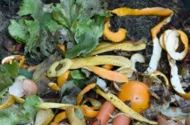In my food scraps composting article in the Spring issue of the Finger Lakes Sierran, I described my search to find a site to compost my food scraps at the end of a trip to Phoenix, AZ. Although I had to bring my scraps back to New York to compost, I did find a local service that collects food waste for a fee to local Phoenix metropolitan residents. Since returning, I have discovered composting programs in our state.
So what is it about composting that is so important to our environment? According to the collection & composting service R. City (in metropolitan Phoenix), approximately 40% of food grown is not eaten, that 95% of food waste goes to landfills or incinerators, and that 50% of the Earth’s topsoil has been eroded. The organic component of solid waste when put in sanitary landfills produces methane, and methane is a much more potent greenhouse gas than carbon dioxide. Methane is a major source of heating our atmosphere and causing climate change. If food waste can be separated and composted instead of being sent to a landfill, the production of methane can be prevented. Additionally, the mulch that is produced can be used to help grow vegetables and flowers and reduce the need to use inorganic fertilizers such as phosphorus and nitrogen (which promote the loss of oxygen in bodies of water, the growth of toxic algae, and the death of fish and other aquatic life).
New York City passed five measures in June 2023 to establish a mandatory city-wide residential curbside organics collection system. This package codifies a mandatory residential curbside organics collection program, sets zero waste targets for 2030, requires annual reporting on Zero Waste efforts, creates community food scrap drop-off sites, and establishes new community recycling centers. This Curbside Composting program is already in effect in parts of several boroughs of NYC currently, and will expand to all boroughs by October 2024.
Residents are instructed to collect leaf and yard waste, food scraps, and food-soiled paper in any container or bag, empty food waste into their building’s outdoor brown-colored bin, and building staff is instructed to set the bin at the curb according to the collection schedule. Residents are instructed to not compost trash such as diapers, personal hygiene products, animal waste, wrappers, non-paper packaging, and foam products. Also, community composting drop-off sites are available.
According to the US Environmental Protection Agency, in 2020 landfills in the United States produced 17% of our total methane emissions. Thus, diverting our organic food and yard waste from landfills to composting would provide a significant decrease in the amount of heat-trapping methane that we are currently producing and emitting.
According to a fact sheet from Seneca Lake Guardian (SLG), a local group fighting for a sustainable economy, zero waste stream, and an urgent transition from fossil fuels to renewable energy sources, composting creates at least twice as many jobs as landfills and four times as many jobs as incineration facilities.
SLG also reported that New York City Councilmember Sandy Nurse and state Assemblymember Anna Kelles have urged the state legislature and the Governor to work together to enact a comprehensive zero waste plan and support organics processing facilities. The lawmakers write that this must be a priority for the state, rather than putting the onus on local municipalities to implement solutions town by town.
As we implement widespread composting programs, we will help decrease the risk of worsening climate catastrophes and as a bonus will produce mulch that will help replenish our diminishing topsoil and our flower and vegetable gardens.
